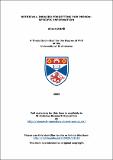Files in this item
Retrieval-induced forgetting for person-specific information
Item metadata
| dc.contributor.advisor | MacLeod, Malcolm | |
| dc.contributor.advisor | Quinn, Gerry | |
| dc.contributor.author | Attrill, Alison | |
| dc.coverage.spatial | xix, 496 p. | en_US |
| dc.date.accessioned | 2018-04-12T08:43:24Z | |
| dc.date.available | 2018-04-12T08:43:24Z | |
| dc.date.issued | 2005 | |
| dc.identifier.uri | https://hdl.handle.net/10023/13120 | |
| dc.description.abstract | Recent research has shown heightened interest in the potential role of inhibitory mechanisms in solving the multiple category problem associated with processing person-specific information. Inhibition has been proposed to control the activation saliency of one category of person-specific information over other activated categories to guide the processing, interpretation and behavioural responses to socially-relevant stimuli. The current research considers a) whether inhibition operates in a similar manner for both self- and other-referent information, and b) whether the inhibitory mechanism associated with laboratory-observed retrieval-induced forgetting is also involved in categorically thinking about the self and others. Participants studied and carried out guided retrieval practice on positive and negative self- and other-referent traits in seven studies that used variants of the retrieval practice paradigm. The observed patterns of forgetting were found to be consistent with the notion that retrieval inhibition operates in a flexible goal-directed manner to reduce the activation of person-specific information that carries little or no meaning for the social perceiver, regardless of whether that information relates to the self or to a target other. Consideration of the significance subjectively attributed to person information showed that both personally significant self information (Studies 4a,b, 5b) and highly informative other-referent material (Studies 2, 5b) are protected against active forgetting, whilst information of low diagnostic value succumbs to inhibitory processing. The goal-directed nature of active forgetting was also shown to operate in an implicit manner (Study 4a) which remained unaffected by attentional focus being brought to bear on target or non-target items (Study 4b). Two main conclusions are discussed, a) that both self- and other-referent information are protected against active forgetting where that information carries meaning for the social perceiver and becomes integrated into existing person-specific knowledge, and b) that both the retrieval practice procedure and the processes involved in categorical person perception may be subject to the same inhibitory mechanism. | en_US |
| dc.language.iso | en | en_US |
| dc.publisher | University of St Andrews | |
| dc.subject.lcc | BF335.A8 | |
| dc.subject.lcsh | Inhibition. | en |
| dc.subject.lcsh | Categorization (Psychology) | en |
| dc.subject.lcsh | Memory--Psychological aspects. | en |
| dc.title | Retrieval-induced forgetting for person-specific information | en_US |
| dc.type | Thesis | en_US |
| dc.type.qualificationlevel | Doctoral | en_US |
| dc.type.qualificationname | PhD Doctor of Philosophy | en_US |
| dc.publisher.institution | The University of St Andrews | en_US |
This item appears in the following Collection(s)
Items in the St Andrews Research Repository are protected by copyright, with all rights reserved, unless otherwise indicated.

